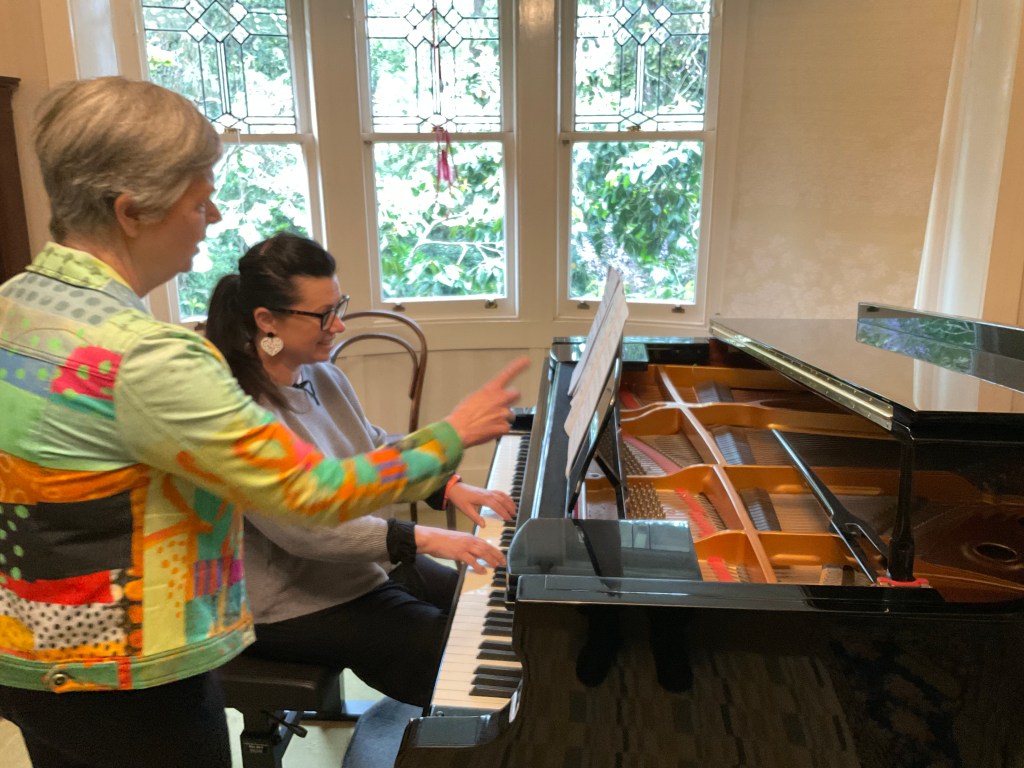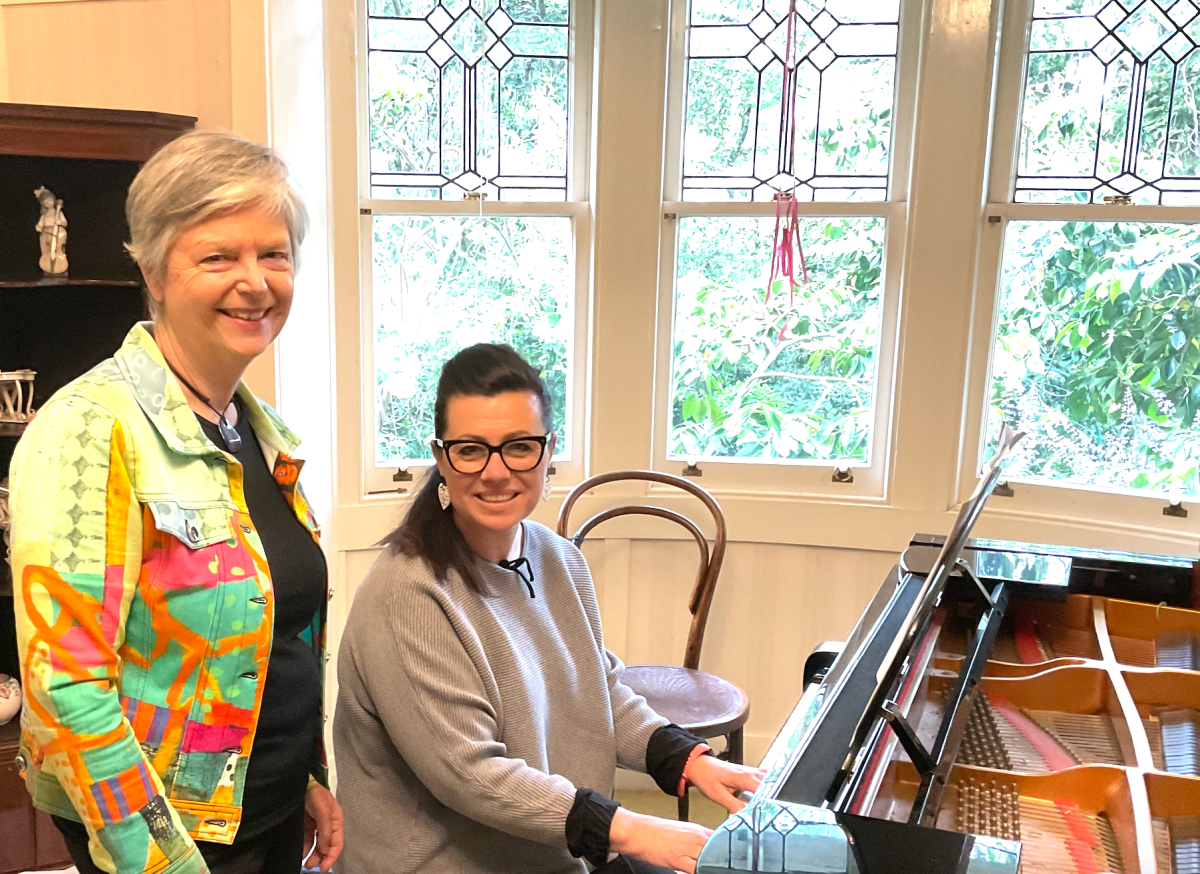Piano teacher Fiona Jury came to her career later in life – she was around 35 when her six-year-old daughter took up piano lessons and she decided to try too. Already a qualified primary school teacher, Jury quickly discovered her special interest in educating and supporting students of all abilities, disabilities and exceptionalities – a specialisation that has been at the heart of her piano teaching practice for the last 12 years.
In 2018, Jury completed the Keys of Life Teacher Training Course with Daphne Proietto (a course specially geared to enabling music students with diverse needs), and in 2020 (‘not good timing as it turns out’), launched pianoAbilities, a piano teaching studio based at her home in Melbourne’s east.
‘It was slow going during the pandemic years,’ recalls Jury, ‘and it felt as though I rebuilt the business at least three times. But I now run lessons six days a week, to approximately 60 students and the studio is at capacity with a growing wait list.’
Studying for her Bachelor of Music in 2022, Jury realised she wanted to tackle her own major weakness: a ‘debilitating’ lack of confidence around performing. She was connected with mentor Robin Baker through the new mentor program run by the Victorian Music Teachers’ Association (VMTA).
Baker is a fourth-generation musician, pianist, examiner, presenter and coach with 40 years’ experience and a speciality in building confidence in her students. (You can watch her YouTube videos for evidence.) An accomplished chamber musician who has recorded for the ABC and the BBC, and has toured the world throughout her career (including touring Asia with the Szigeti Trio), Baker was also the 2023 winner of the inaugural VMTA Geoffrey McFerran Teacher Award.
Despite her extensive experience, Baker says she is still learning and developing the precise communication skills required to teach music and coach performance techniques, and finds herself inspired by Jury’s commitment to her students.
Here they talk about their work together.
Fiona Jury
ArtsHub: How did you come to be involved with Robin Baker as your mentor? And what do you hope will come from the process?
Fiona Jury: Performing has never been my strong point – I suffer from debilitating performance anxiety. I think this is because I came to the piano rather late in life, so performing in public has never been on my radar and I would avoid it like the plague, but this is slowly changing.
In 2022 I decided to embark on a Bachelor of Music. During those studies, and in particular a unit on music psychology with a most wonderful educator, I came to learn a few things about my performance anxiety, and I set about finding a teacher who could assist me first and foremost with my performing skills while also being a teaching mentor.
Can you describe what kinds of contact or meetings you’ve had so far with her?
Following an initial consultation lesson, Robin agreed to work with me, and we’ve been having weekly 60-minute lessons ever since. The lessons are conducted at Robin’s home.
What is it about her work and practice that you particularly like or connect with?
Robin has a most wonderful way of enabling her students. She is warm, encouraging, supportive and kind-hearted, and lessons are a rewarding and empowering experience. She is loaded with a plethora of practice strategies, which I now use with my own students. Currently, I need most help with learning my pieces quickly, so we can focus on the musicality and delivery.
What qualities do you think make for an excellent music teacher-student relationship?
I mainly teach beginners to intermediate level students, but I hope if I continue to improve my skills as both a teacher and performer, I will teach my current cohort of budding pianists for years to come. An excellent music teacher and student relationship, I believe, is derived from many things, namely creating a warm and friendly learning environment where students leave a lesson feeling more empowered than when they arrived.
What is the hardest part of your job as a music teacher? And the most joyous?
I think the most challenging aspect of being piano teacher is trying to fit everything into a 30-minute lesson – sight reading, theory, technique, review pieces, introduce new pieces, aural games… There’s just never enough time.
The most joyous moments for me (and there are many) is when I ask a student, ‘Now, would you like me to demonstrate this new piece or are you happy to have go yourself?’ and they reply with, ‘I’m happy to have a go by myself’. This reply indicates that the student feels comfortable enough to take a learning risk, empowered enough to be an independent learner and confident enough in their skills and knowledge. It’s a magical turning point.
How long have you been involved with the VMTA and what are the most valuable aspects of the membership to you?
I’ve been involved with the VMTA for around four years now – around the time I launched pianoAbilities. The most valuable aspects for me are the professional development opportunities they organise and provide. I find them very responsive to emails, and I feel they genuinely care for, and understand, the vocation that is instrumental and voice teaching.
Read: Me and my Mentor: Britt Salt and Hannah Gartside
Robin Baker
ArtsHub: How did you come to be involved as a mentor to Fiona Jury and what do you hope will come from the process, for both of you?
Robin Baker: We were connected through the new VMTA Mentoring Program. For Fiona, I hope she grows her confidence and security in her own style of teaching. She is a gifted teacher.
For me, I gain a lot from the process – I become more concise in my language and way I communicate the often intangible and esoteric aspects of musical expression.
Can you describe what kinds of meetings you’ve had so far and how it works in reality?
Fiona came to me through the Mentoring Program; however, she did some extra research and came to meet me and is now learning piano from me as well.
She asks me teaching questions in the lesson; for example, how to play certain ornaments, how to finger a certain passage and suggestions for her repertoire.

What is it about her work as a musician and teacher that you particularly connect with?
Fiona has a wonderful ability and gift to inspire adult students and students who have learning challenges and special needs. I admire and respect her commitment and success with her students. For example, she has the most shy, retiring students enjoying playing in her concerts. She makes her student concerts a special event for each student and their parents, and she performs herself, which is wonderful for parents and students to hear and watch.
What kinds of mentoring have you yourself benefited from as an artist and teacher, and what are the main ideas/learnings you want to share with your mentee?
My mentors have been my piano teachers. They have not only impacted my playing, they have impacted the course of my life; for example, being encouraged to apply to study in the UK in the late 1970s and ’80s. I was fortunate enough to study at the prestigious Royal Northern College of Music – I entered as piano soloist for two years then auditioned again to major in piano accompaniment, a total of five years’ study. It showed me discipline and focus and how to practise and perform at the top level.
I’m a fourth-generation musician in my family and my mother found me top teachers from the age of four, so I was extremely fortunate and am forever grateful. I was inspired by hearing my grandfather play piano and my mother play violin and viola.
The main idea I want to share as a mentor, is to give precise and specific instructions when teaching. We, as teachers, have to be very clear in the words we choose – not always easy with the art of music.
There’s often not a right or wrong answer. The key is to make a conscious decision. That creates clear intention within yourself as a teacher – and this is a win-win for you and your students.
If you were giving advice to your music teacher self 20 years ago, would you tell her to do anything differently?
Always to network.
I grew up in an era where networking was considered “blowing your own trumpet”, something considered arrogant. It’s not – it’s absolutely vital. Networking does not mean talking about yourself. It’s about connecting with people and finding commonalities – often nothing to do with music. And learning from others too.
Are there any aspects of the musician’s life and challenges that you wish were explored more in formal education?
Yes, I wish there was more teaching around the business aspect of running a self-employed music business, particularly as a teacher and piano accompanist. Colleges are slowly adding programs; for example, ANAM (Australian National Academy of Music) is addressing this and has a great program.
What has been the most challenging part of building your career as a music teacher? And the most joyous?
The most challenging part is finding students who want, and are committed, to playing their best.
The most joyous part of teaching is having a student express even more of herself through her playing of the music. When this happens, every student is aware of it, through feeling happier and more satisfied with their playing. I always know when they get it. When they feel it, they always spontaneously smile!
How long have you been involved with the VMTA?
I’ve been involved with the VMTA for decades as a member, teacher and presenter and I was on the Board for three years. The main reason I’m now continuing membership is to continue to support the community of music teachers.
The VMTA’s student concerts are vital for my own students too – a most valuable resource – all done through volunteers. I say a special thank you to them. The VMTA is doing great work, raising the profile of music teachers in the community. This is vital for maintaining the longevity of your career as a music teacher – it takes a lot of energy and focus to build skills in and guide every single individual student. Building skills to play an instrument or sing is such a complex process.
Find out more






